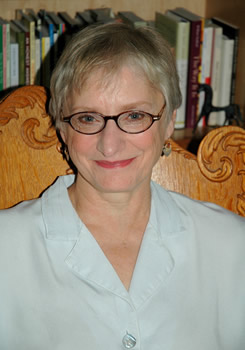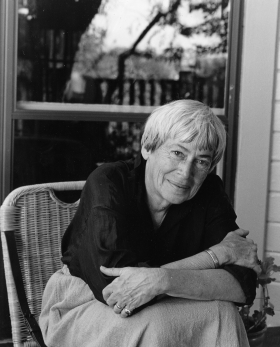Ursula Le Guin and Molly Gloss were two of the keynote speakers at last week’s conference for the Association of Writers and Writing Programs. I’d never been to the conference before, but I couldn’t help but be surprised; there is a fairly common—and justified—defensiveness among SFF readers and writers when it comes to the mainstream literary world, whether due to its cooption of writers like Kurt Vonnegut and Angela Carter, or to its perpetuation of the high art/low art divide. Or, if you’re like my friends and me, you’ve been in college or even MFA classes that bar genre fiction entirely, that compare your work to Twilight, and that generally conflate genre with formula, heavy-handedness, and as Brook Wonders phrased it, a lack of “aesthetic ambition.”
The program for AWP, though, was pretty great. In addition to Le Guin and Gloss, there were numerous panels and readings dedicated to—or at least in the realm of—speculative fiction. More vital than that, though, was the ongoing conversation about genre that I encountered there. Not every dialogue was successful, and still more tended towards semantic nuance, but they were happening and they were easy and pleasing to find. MFA culture, if not the literary landscape at large, seems to slowly and surely be easing into a more diverse range of concepts and content.
The turnout for Le Guin and Gloss’ reading was as enormous as you’d expect to find at a genre-specific convention. Neither of them pulled any punches, either—reminding audience and moderator alike that the community they found in SFF was vital to their voices being heard at all. Le Guin spoke of poetry at the time, but her suggestion that “form pulls something out of you that you didn’t know was there,” seemed particularly poignant in its context. Was creating new worlds more difficult than writing in old ones? No, they both responded, distancing oneself from reality frees, rather than constricts, the author. Genre, like the sonnet form in poetry, provides them with space to say what needs saying.
And what needs saying is often times hard to hear. Both women fielded questions about breaking into science fiction as a male-dominated field. Le Guin’s response—that she “didn’t care what men were doing,” that it wasn’t a feminist movement, but “just taking over,” was patently great. Gloss was quick to point out, though that the question had disregarded the masculinity of the literary canon. Their “take-over” was not of an inherently misogynist genre, but of a larger, male-dominated publishing industry and culture.

The resonance of Le Guin and Gloss’ ideas permeated much of the conversation about genre at AWP, about ‘othering’ a genre based on problems that permeate across genre lines. One panel in particular captured this sentiment, the aptly named, “Give Me Your Vampires, Your Fae, Your Bulbous Alien Masses Yearning to Breathe Free.” Brook Wonders, Nick Mamatas, and Rahul Kanakia each had very different things to say about teaching genre in the university classroom, but were united in their conviction that writing, no matter what its content, is alike in the problems it addresses. Your students might not write genre as well as canonical masters like Austen or Poe, Wonders told the teachers in the room, “but that doesn’t mean they won’t.” Kanakia spoke of the myth that literary fiction strives exclusively for beautiful prose—reminding us of the highly conceptual, plot-driven work of Jeffery Eugenides and Meg Wolitzer. He derided “the belief—held by many literary writers—that genre is somehow inherent to a work: that one zombie novel is inherently a genre novel because it’s poorly-written, and another zombie novel is inherently a literary novel because it’s more mature and complex and beautiful.” Bad writing, Wonders and Kanaka agreed, was bad writing, and you will get as much bad literary fiction as you will bad genre fiction in a university classroom.
Mamatas went a slightly different route, tracing the history of publishing to highlight its economic divisions. The pulps, produced for and by the working class, and the “slicks,” which paid their authors and were only accessible to the middle and upper class, is just one example of this phenomenon. If the middle class is in charge of schools, he said, the schools will work in the mode of the middle class. Like Wonders and Kanaka, though, Mamatas spoke in terms of the larger picture—it’s high time that we stop pretending that the literary world’s dialogue about genre has anything at all to do with “bad writing” alone. Surprisingly, art doesn’t exist in a vacuum—economic or otherwise.
AWP also hosted the celebrated release of Chad Harbach’s book, MFA vs NYC: The Two Cultures of American Fiction (the original essay can be found here), which details yet another literary war, this time between a culture of Writers as Teachers (MFA) and Writers as Self-Sustaining Writers (NYC). This begs the question: where does genre fiction fall in all of this? I won’t pretend to be qualified enough to counter Harbach’s argument, or even imitate its affect. As someone steeped in the world of university creative writing, though, I find that the question is vital to the ideas that Mamatas proposed in his discussion of economics. It’s a common critique that MFA programs, like Academia at large, write for themselves rather than for the “masses.” By deriding, sometimes even banning, genre in the classroom, don’t they become even more self-contained, even less likely to affect larger audiences, ideas and social structures?
Writers like Le Guin and Gloss opened the dialogue about genre’s capacity for social change decades ago. If the turnout for their reading, and the strength of voice across AWP’s genre-related panels are anything to go by, their words are ringing loud and clear. SFF is not so much clawing its way into the literary world as it is revealing that it’s been there all along. Fabulist authors like Karen Russell might, as Kanakia pointed out to me, be working from a “different tradition,” but their work is nonetheless pushing the boundaries of what is acceptable in MFA classrooms. Now it’s time for MFA programs to admit that writers all face the same problems—whether in economic, gendered, or racial privilege, or in plain old bad writing.
Emily Nordling is a grad student at the University of Chicago, where she is happy to report that her spec fic is very well received in workshops.










